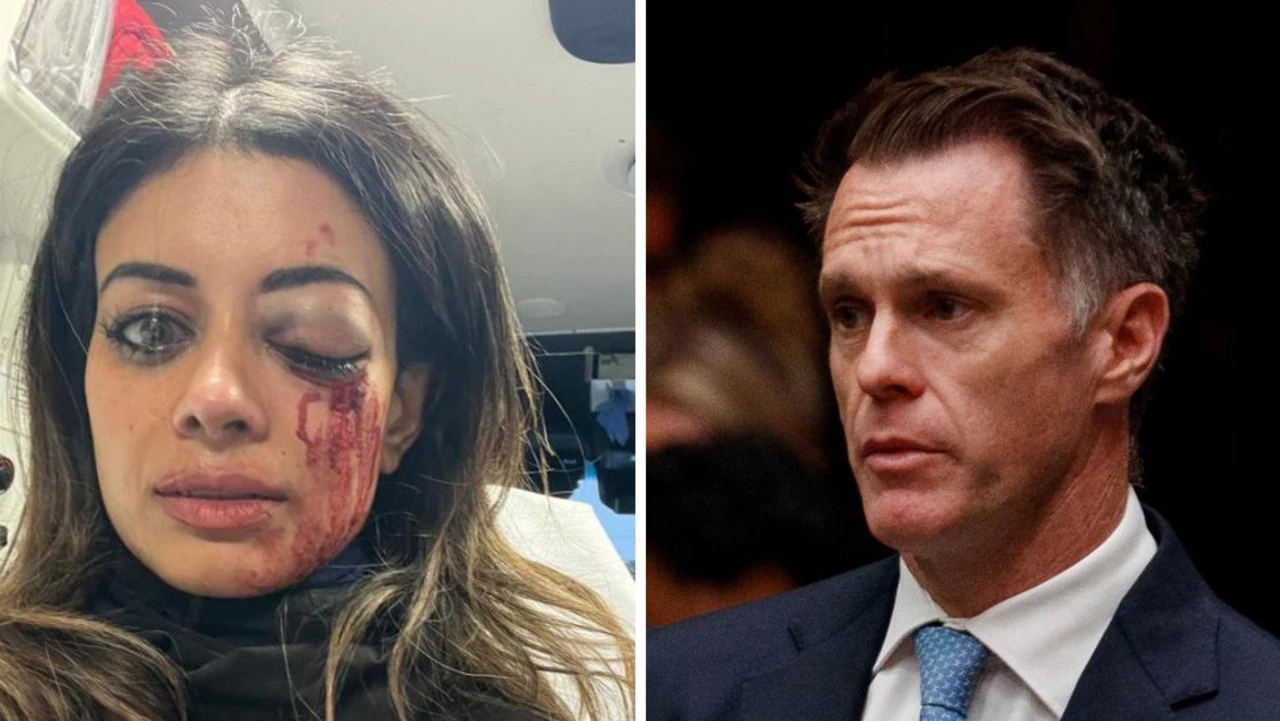By Clareese Packer
Hannah Thomas was pictured with a swollen right eye and streaks of blood down her face after a protest outside SEC Plating in Belmore in Sydney’s southwest on Friday.
The company was picketed over reports it provided jet components used by the Israeli Defence Force, according to a NSW Greens statement.
Ms Thomas, who was charged by police over the incident, has claimed she may have suffered permanent vision damage following the protest.
NSW Greens MP Sue Higginson has since appealed to NSW Premier Chris Minns to turf controversial protest laws and have charges against Ms Thomas dropped, arguing there was evidence police “acted beyond the scope of their lawful powers”.
New laws introduced in February have given police fresh powers to prevent protesters from harassing, intimidating or threatening people accessing or leaving — or attempting to access or leave — places of worship.
This also extends to people intentionally blocking, impeding, or hindering people accessing or leaving places of worship, with a maximum penalty of two years imprisonment.
The laws were brought in less than a month after news of an explosives-laden caravan being found in Dural broke, which later proved to be a fake terrorism plot rather than an anti-Semitic attack.
Ms Thomas has claimed her injuries were a result of the “draconian anti-protest laws”, which are currently subject to a constitutional challenge in the NSW Supreme Court launched on behalf of the Palestine Action Group (PAG).
However, NSW Police southwest metropolitan region commander Assistant Commissioner Brett McFadden on Monday told 2GB the anti-protest legislation wasn’t applicable to this situation, maintaining it was an unauthorised protest.
In her letter, Ms Higginson cited alleged contradictory police statements, photographic and video evidence, witness accounts, and NSW protest law.
“What occurred in Belmore was not policing — it was punishment,” Ms Higginson wrote in her letter.
“A member of our community was brutally assaulted by uniformed officers while engaging in peaceful political expression,” she alleged.
“This has happened in a state where you and your government have continuously expressed intolerance for protest and embodied police to suppress protest through arbitrary, dangerous laws and sweeping police powers.”
Ms Higginson has appealed to the Premier to intervene and have all charges against Ms Thomas, and others arrested on the day, dropped, and for police to declare it a critical incident.
However Mr McFadden told 2GB he couldn’t identify any misconduct, that he backed the actions of police, and he was comfortable in not declaring a critical incident based on information provided to him.
Ms Higginson also pushed for a clear public directive to be issued to NSW Police to state protest is lawful and must be protected.
Ms Higginson then turned her attention to the state government, urging Mr Minns “acknowledge your government’s role in emboldening excessive and violent policing” via the expansion of protest laws.
Further, she called for the new anti-protest laws to be repealed.
“The trust between the community and the police has already been deeply damaged,” Ms Higginson wrote.
“Every day that passes without independent accountability and recognition of the harm that your Government’s actions have caused will further fracture the legitimacy of your leadership.”
Mr Minns told a press conference he wasn’t prepared to “condemn” the actions of police given Ms Thomas didn’t provide a statement to police, making it difficult to determine what had happened.
Critical incidents are also typically declared based on health information, which is hard when that is not provided, he said.
The Law Enforcement Conduct Commission (LECC) could step in at any time, Mr Minns said while also rejecting suggestions his own actions had emboldened police over the years.
Speaking of Friday’s protest, he said everyone had a right to protest, but not to go after specific businesses.
He wished Ms Thomas well in her recovery.
“I don’t want this to be lost in, I guess, the politics of the general caravan inquiry and changes to the law,” Mr Minns said.
“I genuinely hope that she’s back on her feet as soon as possible, and she has a full recovery.”
Police issued Ms Thomas with a future court attendance notice on Sunday and charged her with hinder/resist police and refuse/fail to comply with direction to disperse.
She will appear in Bankstown Local Court on August 12.
Four others were also handed down various charges.
Mr McFadden said Ms Thomas was “currently in a satisfactory condition”, and that he was advised her medical records relating to the incident would be made available to police.
Speaking at a press conference, he said police were still in the process of getting the information following talks with her solicitor, with the medical records set to assist him in understanding whether it was a critical incident or not.
“Quite clearly I am open to consideration of the nature of the injuries, I take the assessment and evaluation of any incident relating to a potential critical incident seriously, and it’s something that the public should have confidence that we do take seriously,” Mr McFadden told reporters on Monday.
He said it was “most unusual” for it to take this long to gain an understanding of injuries, but that he respected Ms Thomas’ choice not to provide information to police when approached directly on Sunday.
“That’s her decision, that’s respected, but equally I can’t make the decisions that I need to make without the full weight of information,” he said.
Mr McFadden added the charges laid over the protest were not related to any of the new legislation brought forth by the Minns government.
